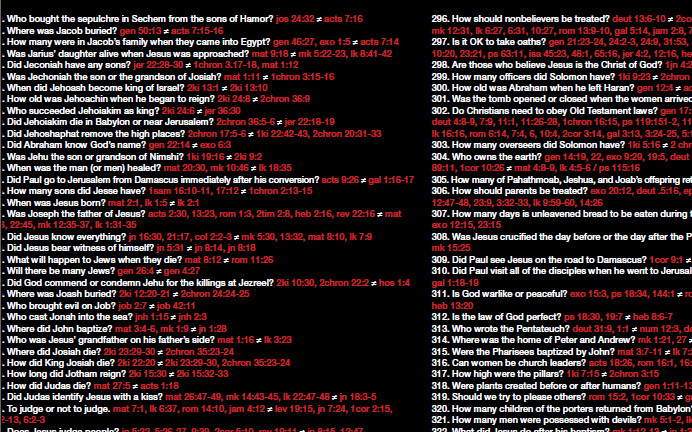Pages 633-636 … The Bible — some Q’s; some A’s
“God has all authority, and we accept the Bible as the primary authority by which God communicates to us what God wants us to believe and do.”
Fair enough, my Friend. And yet what happens when the Bible itself gives us conflicting information? – or makes contradictory statements? – or establishes immoral laws? What then? … Please consider the following VERY IMPORTANT Biblical facts, and the just-as-important questions that they call forth:
Question 01) What are we to do when we discover that the Word of God has been tampered with &/or incorrectly deciphered?
*… like when the original “if any believing woman” in 1 Timothy 5:16 has been altered to read “if any believing man”?
*… or when the original text of Numbers 12:8, which read “[Moses] beheld the form of the Lord”, has been changed to read “[Moses] saw the glory of the Lord”?
*… or when the original text of Deuteronomy 32:8, which read “he fixed the boundaries of the peoples according to the number of the gods”, has been changed to read “he fixed the boundaries of the peoples according to the number of the Israelites” [or sometimes “the sons of Israel” or sometimes “the sons of God”]?
What are we to do in such cases, Lucy? How are we to know which texts have been altered by man and which have not? And what are we then to do with the verses that have clealry been so altered?
Question 02) And what are we to do when we discover that the Word of God has been added to; when men have taken the original texts and added their own theological beliefs thereto?
*… like when the original Gospel of Mark reached its conclusion at Mark 16:8, but then men thereafter wrote & attached Mark 16:9-20 thereto?
*… or when the Gospel of John reached a conclusion at John 7:51, but then men thereafter wrote & inserted John 7:52-John 8:11 thereto?
*… or when the book of 1 John originally contained no mention of the Trinity whatsoever, but then men wrote & attached “the Johannine Comma” (1 John 5:8) thereto?
*… or when “God the only Son” [or “God the only God”] in John 1:18 (clearly referring to God the Father) was changed to read “the only begotten Son” (clearly referring to Jesus Christ)?
*… or when the original “for you will die in your sins unless you believe that I, I am” in John 8:24 was changed to read “for you will die in your sins unless you believe that I am he”?
What are we to do in such cases, my Friend? How are we to even know how many such alterations exist? And what are we to do with them once they are discovered?
Question 03) And what are we to do when we find passages of Scripture – significant portions of the Word of God – that are still fully untranslatable?
*… like 1 Samuel 13:1, which to this day still reads, “Saul was ____ years old when he began to reign; and he reigned ____ and two years over Israel”?
*… or like Proverbs 11:30, which simultaneously reads as, “The fruit of the righteous is a tree of life, but violence takes lives away” (NRSV), and also “The righteous shall never be removed, but the wicked shall not inhabit the earth” (KJV), and also “The fruit of the righteous is a tree of life, but he who wins souls is wise” (NIV)?
*… and like John 8:25, the accurate translation of which to this day resides somewhere between “Why do I speak to you at all” and “The beginning, that which I also say to you”?
What are we to do in such cases, my dear? How are we to even know which verses have been translated accurately and which are still not fully understandable to humankind? And what are we to do with such verses once we discover them? How are we to heed their call or respect their message when no one on Earth currently knows what their message truly is or what they are truly calling for us to know or do?
Question 04) And what happens when two or more verses – two or more portions of the unalterable & “infallible” Word of God – directly contradict one another, as is the case in over 400 instances within the Bible’s texts? [see the image below &/or the larger, more complete display thereof on pages 378-379 herein] … What are we to do in such instances, Lucy? We cannot adhere to or believe in both sides of those contradictions without destroying the infallibility of God’s Word, so how are we to know which verses to believe and which to discard? How are we to know which verses are “of God” and which are merely “of man”?
Question 05) And what happens when we discover that the messengers of God in the Bible misquote, misapply or misinterpret the Scriptures that came before them?
*… like when James uses Amos 9:11-12 out of context in Acts 15:16-17?
*… or when Paul molds Psalm 143:2 into a new context in Romans 3:20?
*… or when Paul alters the focus of Isaiah 28:16 in Romans 9:33b?
*… or when Paul inverts the meaning of Isaiah 52:15 in Romans 15:21?
*… or when Paul incorrectly claims that a non-Biblical Jewish writing (“What no eye has seen, nor ear heard, nor the human heart conceived, what God has prepared for those who love Him”) is Holy Scripture in 1 Corinthians 2:9?
*… or when Paul actually uses bits and pieces of several Old Testament texts to compose his own scripture in 2 Corinthians 6:16-18?
*… or when Jesus himself does the same thing using seven different Old Testament verses in Mark 13:24-25?
*… or when Jesus “composes” his own Scripture by creatively fusing Isaiah 56:7 & Jeremiah 7:11 in Luke 19:46?
*… or when Jesus alters the context of Micah 7:6 while paraphrasing it in Luke 12:53?
What are we to do in such cases, Lucy? Are we to adopt the new, altered meanings of the old verses and discard the older ones, or are we to disregard those newer alterations and focus instead on the meanings those verses were originally given?
Question 06) And finally – and for this thread most importantly, what happens when the Word of God authorizes or even compels us to obey immoral laws?
*What are we to do when the Bible authorizes the possession of human slaves (see Exodus 2:7 & Ephesians 6:5-9) …
*… or when the Old Testament encourages unnecessary acts of brutal cruelty to animals (see Genesis 9:2 & Leviticus 11:1-47) …
*… or when the Bible openly affirms the denigration of women (see 1 Timothy 2:12 & 1 Corinthians 14:34-35) …
*… or when the Old Testament justifies genocide (see Deuteronomy 7:1-2 & Joshua 10:40) …
*… or when the Bible champions acts of unjust warfare (see Numbers 31:2, 1 Samuel 15:3 & Joshua 4:13) …
*… or when both Testaments authorize racism (see Numbers 25:1-13 & 2 John 1:10)? …
*… or when the Old Testament encourages religious persecution (see Exodus 22:20 & Deuteronomy 13:6-10) …
*… or when the Bible justifies rape (see Deuteronomy 22:28-29 & Judges 21:10-24) …
*… or when the Old Testament justifies sex-slavery (see Genesis 19:8 & Judges 1:12-13) …
*… or when the Bible affirms the mass murder of children (see Exodus 12:29-30 & Numbers 31:17-18)?
What are we to do in such cases, my Friend? Are we to strictly adhere to these passages of Scripture that champion such despicable acts (like you and yours are doing when you cling to Leviticus18:22 & Leviticus 20:13, the latter of which actually calls for the outright murder of all homosexuals)? …
I would say, certainly NOT!
As such, how are we to know which verses are of God &/or which interpretations thereof are truly Holy? Indeed, the Bible itself tell us that “the Word of God is very close by – in your mouth and in your Heart” (Deuteronomy 30:14), and that we all “know [the Spirit of Truth], because It abides within you” (John 14:7). But how are we to decipher this Spirit? How are we to look at all the conflicting verses and discordant theologies within the Scriptures and know which ones abide with the Will of God?
Well, fortunately, the Bible itself lets us know on more than one occasion that there is indeed a powerful & fool-proof method available that we can all use to test the Scriptures and thereby know which are in harmony with God’s Will and which are not … And this test – as some of you reading along might have guessed – is known as “The Fruit of the Tree”, the method whereby a particular verse or passage from the Bible (or a particular interpretation thereof) is put into practice earnestly & courageously in order to see what effects it engenders & what consequences it brings. If doing so brings the “bad fruit” of anger or sadness or fear or despair or conflict, then that verse or passage (or interpretation thereof) is not “of God”, whereas if doing so engenders the “Good Fruit” of Peace or Joy or Love or Caring or Harmony, then it is.
Consider the Word of God on this matter:
“And I will ask my Father, and He will give you another Advocate to be with you forever. This is the Spirit of Truth … You know Him, because He abides with you and He will be within you … Do not judge by mere appearances, but judge with sound discernment … Beware of false prophets, who come to you in sheep’s clothing but inwardly are ravenous wolves. You will know them by their fruits … Either make the tree good, and its fruit good; or make the tree bad, and its fruit bad; for every tree is known by its fruit … So why do not judge for yourselves what is Right?” ~ Jesus Christ (John 14:16-17 + John 14:26 + John 7:24 + Matthew 7:15-16 + Matthew 12:33 + Luke 12:57)








 ;
;